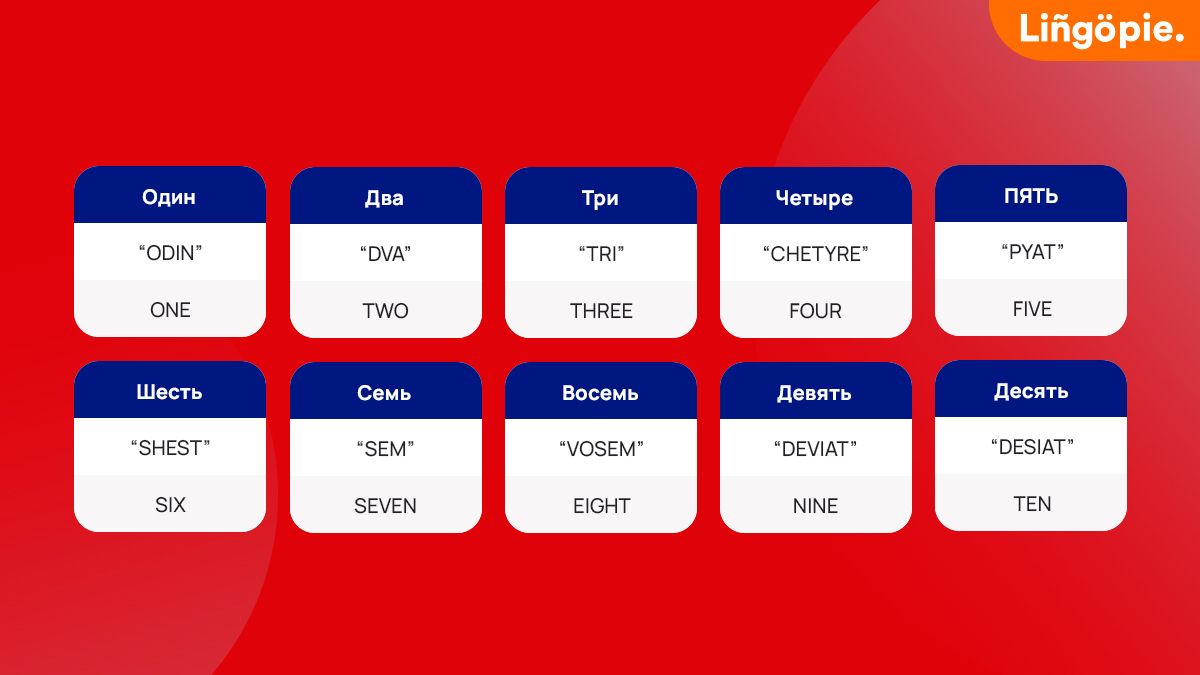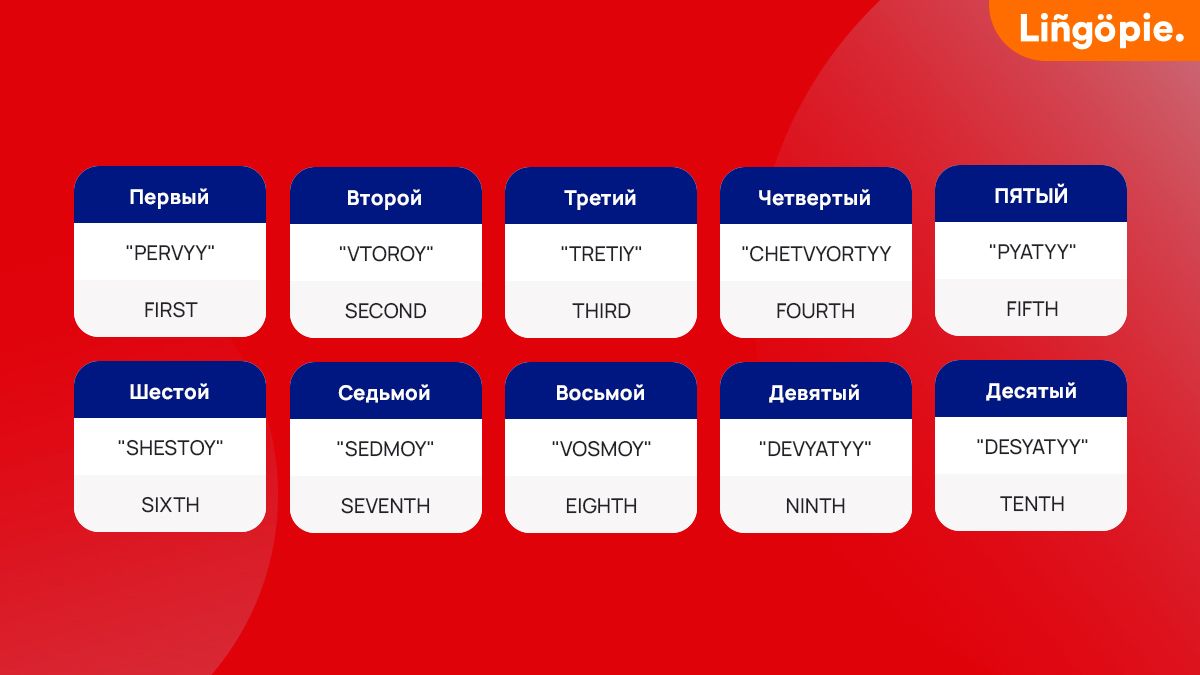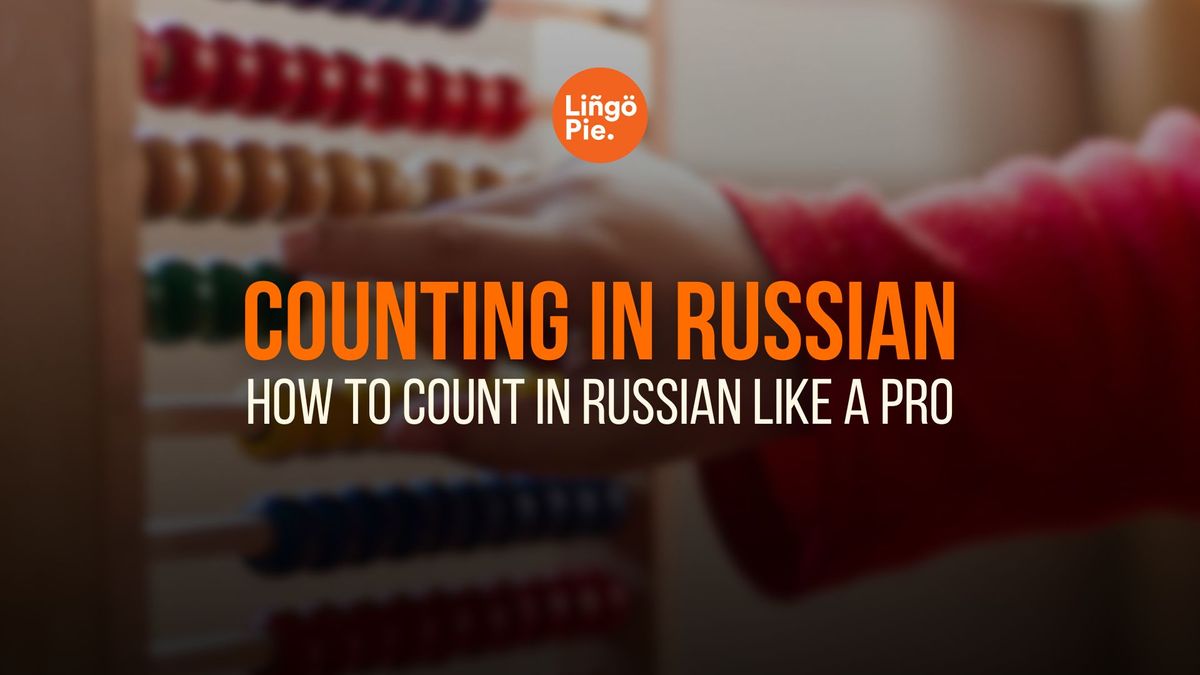If you want to learn the Russian language, numbers are an important aspect of your language learning journey. They are a key component in spoken and written Russian and vital for everyday life. The good news is they aren't too tricky to learn!
This article will look at the cardinal numbers 1 to 1,000 and ordinal numbers 1 to 10. Moreover, you will learn how to say the date and time in Russian using numbers, and get a brief overview of some aspects of Russian grammar.
For further practice with pronunciation and vocabulary, we recommend you stream Russian TV and movies so you can hear native Russians use these terms in a natural context.
Related: The Best Way to Learn Russian: Easy Step-by-Step Guide

Russian Numbers 1-10
First, we will look at Russian cardinal numbers 1 to 10. A cardinal number is used for counting how many of something there is. They start from 1 and do not include fractions.
As you could guess, cardinals are very important aspects of language. You need to be able to use them for ordering food and drink (two coffees, please), counting objects (there is one tree in the garden) and giving specific information (I have a table for four).
Here are the Russian numbers 1 to 10:
- Один (“odin”) - One
- Два (“dva”) - Two
- Три (“tri”) - Three
- Четыре (“chetyre”) - Four
- Пять (“pyat”) - Five
- Шесть (“shest”) - Six
- Семь (“sem”) - Seven
- Восемь (“vosem”) - Eight
- Девять (“deviat”) - Nine
- Десять (“desiat”) - Ten
The words in parenthesis illustrate how these numbers are written in the Latin alphabet.
They instruct the correct Russian pronunciation, however, they are not phonetic. "Odin", for instance, is pronounced like "ah deen".
You might benefit from looking up YouTube videos or podcasts of Russian lessons on your computer so you can listen to a native using number-related vocab in Russian.
This will help you to learn the correct pronunciation.

How To Use Russian Numbers In A Sentence
We won't lean too heavily into grammar today, but it is worth noting the following:
When the numbers one and two, or один (“odin”) and два (“dva”), are put before a noun, they change their form according to the gender of the noun. In Russian, nouns can be masculine, feminine or neuter in gender:
- Masculine: один ("odin"); два ("dva")
- Feminine: одна ("odna"); две ("dve")
- Neuter: одно ("odno"); два ("dva")
Here are some examples to illustrate:
- Masculine nouns:
- Один стол ("odin stol") - One table
- Два стула ("dva stula") - Two chairs
- Feminine nouns:
- Одна книга ("odna kniga") - One book
- Две кошки ("dve koshki") - Two cats
- Neuter nouns:
- Одно яблоко ("odno yabloko") - One apple
- Два окна ("dva okna") - Two windows
Russian Ordinal Numbers
Most ordinal numbers are relatively easy to learn once you know how to count in Russian, with the exception of "first" and "second", as they look similar to the cardinal numbers.
Knowing ordinals in Russian is very useful for making lists, establishing rankings and so on. They look like this:
- Первый ("pervyy") - First
- Второй ("vtoroy") - Second
- Третий ("tretiy") - Third
- Четвертый ("chetvyortyy") - Fourth
- Пятый ("pyatyy") - Fifth
- Шестой ("shestoy") - Sixth
- Седьмой ("sedmoy") - Seventh
- Восьмой ("vosmoy") - Eighth
- Девятый ("devyatyy") - Ninth
- Десятый ("desyatyy") - Tenth

Russian Numbers: Counting from 11 to 20 in Russian
To form numbers 11 to 19, we generally add надцать ("nadtsat") to the numbers 1-9. Think of надцать as similar to "-teen" in English. However, as always with foreign languages, there are exceptions to the rules! For number 12, два changes to две. Moreover, when forming the number 14, the "e" at the end of "четырe" is dropped.
Let's break it down with examples:
- 11 - одиннадцать ("odinnadtsat") Example: У меня одиннадцать книг. (U menya odinnadtsat' knig.) - I have eleven books.
- 12 - двенадцать ("dvenadtsat") Note: Here, два changes to две. Example: Мне двенадцать лет. (Mne dvenadtsat' let.) - I am twelve years old.
- 13 - тринадцать ("trinadtsat") Example: В классе тринадцать студентов. (V klasse trinadtsat' studentov.) - There are thirteen students in the class.
- 14 - четырнадцать ("chetyrnadtsat") Note: The "e" at the end of "четырe" is dropped. Example: Я купил четырнадцать яблок. (Ya kupil chetyrnadtsat' yablok.) - I bought fourteen apples.
15 to 19 - The soft sign ь is dropped from the original numbers:
- 15 - пятнадцать ("pyatnadtsat")
- 16 - шестнадцать ("shestnadtsat")
- 17 - семнадцать ("semnadtsat")
- 18 - восемнадцать ("vosemnadtsat")
- 19 - девятнадцать ("devyatnadtsat")
Example: Мне нужно девятнадцать рублей. (Mne nuzhno devyatnadtsat' rubley.) - I need nineteen rubles.
- 20 - двадцать ("dvadtsat") This one is a bit different, but easy to remember! Example: На столе двадцать тарелок. (Na stole dvadtsat' tarelok.) - There are twenty plates on the table.
How to Count up from 20 in Russian
From here, counting in Russian is super straightforward. You simply add the numbers 1-9 to 20 to make 21, 22, and so on.
For example, двадцать ("dvadtsat"), which is 20, and oдин (“odin”), 1, come together to make двадцать один ("dvadtsat odin"), 21.
The same applies to the rest of the tens:
- тридцать ("tridstat") - Thirty
- сорок ("sorok") - Forty
- пятьдесят ("pyatdesya") - Fifty
- шестьдесят ("shestdesyat") - Sixty
- семьдесят ("semdesyat") - Seventy
- восемьдесят ("vosemdesyat") - Eighty
- девяносто ("devyanosto") - Ninety
So, for instance, 33 is тридцать три ("tridtsat tri") and 64 is шестьдесят четыре ("shestdesyat chetyre"). Easy, right?
Try creating your own sentences using these numbers. Start with simple ones like "I have..." (У меня есть...) or "I see..." (Я вижу...). For example:
- Я вижу двадцать три птицы. (Ya vizhu dvadtsat' tri ptitsy.) - I see twenty-three birds.
- У меня есть восемьдесят семь карандашей. (U menya est' vosem'desyat sem' karandashey.) - I have eighty-seven pencils.
Remember, practice makes perfect! Don't be afraid to use these numbers in your daily Russian practice. The more you use them, the more natural they'll become. You're doing great - keep it up!
Counting in the Hundreds in Russian
In Russian, like in English, we build larger numbers by combining hundreds, tens, and ones. The order is always: [Hundreds] + [Tens] + [Ones].
First, memorize these numbers for hundreds:
- стo ("sto") - One hundred
- двести ("dvesti") - Two hundred
- триста ("trista") - Three hundred
- четыреста ("chetyresta") - Four hundred
- пятьсот ("pyatsot") - Five hundred
- шестьсот ("shestsot") - Six hundred
- семьсот ("semsot") - Seven hundred
- восемьсот ("vosemsot") - Eight hundred
- девятьсот ("devyatsot") - Nine hundred
Let's build some numbers:
- 245 - двести сорок пять ("dvesti sorok pyat'") = 200 (двести) + 40 (сорок) + 5 (пять)
- 378 - триста семьдесят восемь ("trista sem'desyat vosem'") = 300 (триста) + 70 (семьдесят) + 8 (восемь)
- 501 - пятьсот один ("pyat'sot odin") = 500 (пятьсот) + 0 + 1 (один)
Now, try forming these numbers:
- 632
- 815
- 999
Tips for Beginners:
- Practice saying the hundreds out loud. Repetition helps with memorization.
- Start with "round" numbers like 100, 200, 300 before moving to more complex ones.
- Use real-life contexts: imagine counting money or objects to make it more relatable.
- Don't worry about perfection. Even if you make mistakes, native speakers will usually understand you.
Counting in the Thousands in Russian
To form other thousands, we use a number + тысяча, but the form of тысяча changes depending on the number before it. To do this, review the basic forms below:
- 1,000 - одна тысяча ("odna tysyacha")
- 2,000 - две тысячи ("dve tysyachi")
- 3,000 - три тысячи ("tri tysyachi")
- 4,000 - четыре тысячи ("chetyre tysyachi")
- 5,000 and above - [number] тысяч ("[number] tysyach")
To form numbers like 1,234 or 5,678, combine what you've learned about hundreds with thousands:
- 1,234 - одна тысяча двести тридцать четыре ("odna tysyacha dvesti tridtsat' chetyre")
- 5,678 - пять тысяч шестьсот семьдесят восемь ("pyat' tysyach shest'sot sem'desyat vosem'")
Remember:
- For 1,000 to 4,000, тысяча changes its ending.
- For 5,000 and above, always use тысяч.
- The number before тысяча follows the gender rules (одна, две for feminine).
Keep practicing, and soon you'll be counting large numbers in Russian with ease! Try creating simple sentences using these numbers to reinforce your learning.
Saying Years Using Numbers in Russian
The Russian word for "year" is год (pronounced "god"). It's a masculine noun, which is important to remember. In Russian, we express years similarly to English, but with a twist:
- We use ordinal numbers (first, second, third, etc.) instead of cardinal numbers (one, two, three, etc.)
- The year is expressed as a single compound number
Here are some examples:
- 1925: тысяча девятьсот двадцать пятый (tysyacha devyat'sot dvadtsat' pyatyy)
- 1876: тысяча восемьсот семьдесят шестой (tysyacha vosem'sot semdesyat shestoy)
Note: When expressing years, there are two ways to say 1000 in Russian:
- тысяча (tysyacha or tyshcha) - commonly used in spoken language
- одна тысяча (odna tysyacha) - more formal
How to Say the Time in Russian
When you are saying the time rounded to the neasrest hour, you say the cardinal plus час ("chas"), часа ("chasa") or часов ("chasov"). You say час for 1 o’clock, часа for 2 to 4 o’clock, and часов for 5 through 12 o’clock.
So, два часа ("dva chasa") means it's two o'clock and восемь часов ("vosem chasov") is it's eight o'clock. Simple!
Russians often use these handy expressions:
- Half past = половина (polovina) + next hour in genitive case Example: 1:30 - половина второго (polovina vtorogo)
- Quarter past = четверть (chetvert') + next hour in genitive case Example: 2:15 - четверть третьего (chetvert' tret'ego)
- Quarter to = без четверти (bez chetverti) + upcoming hour Example: 5:45 - без четверти шесть (bez chetverti shest')
How to Practice Russian Numbers
Aside from video lessons and Russian podcasts, there are many more options for practicing Russian counting. These include watching movies and TV, reading local newspapers, listening to music and even engaging with a language exchange partner from Russia online.
When you watch Russian TV and movies you see authentic examples of number usage in sentences, in a natural context. Moreover, you pick up on pronunciation, hear different accents, and learn how to use vocabulary and phrases in the correct way.
To learn Russian, be sure to check out these posts:
Facts About The Russian Language
Russian is spoken by over 258 million people worldwide. It is the official language of Russia, Belarus, Kyrgyzstan, and Kazakhstan.
Russian is also spoken in several other countries, including Ukraine, Latvia, Lithuania, Estonia, Azerbaijan, Moldova, Uzbekistan, Turkmenistan, and Tajikistan. In fact, it is the most spoken Slavic language in Europe.
The thought of learning Russian can be daunting, as it has a different alphabet and sounds very different from English.
However, it is incredibly rewarding when you can communicate in a language spoken by around 221 million Europeans and it opens up a world of engaging and fascinating literature, TV, movies and other Russian arts.
Learning to speak and write in a new language is a long and, at times challenging process, but it is made easier if you have a genuine determination and passion for language learning. With the right resources, it can even be fun!
If you're interested in learning about Russian numbers there is a good chance you're a beginner-level student of this language, in which case our article explaining how to say the days of the week in Russian may be of interest to you.
Learn Russian With Lingopie
This has been a brief guide to counting in Russian.
We have covered cardinal numbers 1 to 1,000 and ordinals 1 to 10. Moreover, you can now say the date and basic time in Russian.
Save this article for future reference and don't forget to use other forms of media to advance your studies! You can access more articles online to deepen your knowledge or engage with other resources.
Check out Lingopie's features for more Russian practice. This is a great online streaming platform through which you can binge many Russian TV shows and movies.
Watch these shows to learn how to use numbers and other useful vocab in the correct manner. Stick with it, and happy learning!






![Russian Alphabet: Everything You Need to Know [2025]](/blog/content/images/size/w300/2025/04/Russian-alphabet-.jpg)


